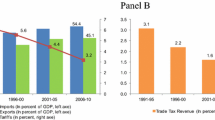Summary
In this article it is shown that expenditure-switching policies, like exchange rate protection, tariff protection and export subsidizing, might increase the level of employment and welfare in the short run (when indexation of factor prices is absent). Complete indexation of factor prices, however, makes exchange rate protection senseless. In the case of tariff protection, complete indexation will even worsen employment and welfare (protection becomes impoverishing).
Only a policy of export subsidies makes sense if employment is to be improved in an indexed economy. This additional employment, however, is paid for with a deterioration of the terms of trade and the risk of retaliation. Therefore, taking the long run view, expenditure switching policies should be rejected for macro-economic purposes.
Similar content being viewed by others
Additional information
The author is professor of international economics at Tilburg University. He would like to thank Dr. G. van Roij of the department of economics at Tilburg University and an unknown referee for their remarks, which led to an improvement of this article.
The author is professor of international economics at Tilburg University. He would like to thank Dr. G. van Roij of the department of economics at Tilburg University and an unknown referee for their remarks, which led to an improvement of this article.
Rights and permissions
About this article
Cite this article
Van Veen, P. Employment, welfare and reserve effects of global protection. De Economist 127, 539–550 (1979). https://doi.org/10.1007/BF02371700
Issue Date:
DOI: https://doi.org/10.1007/BF02371700




